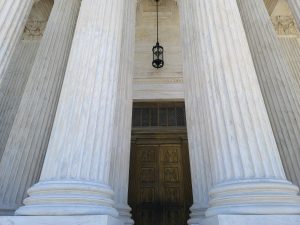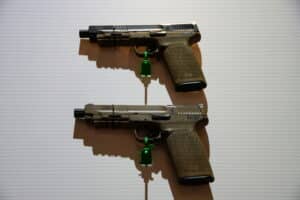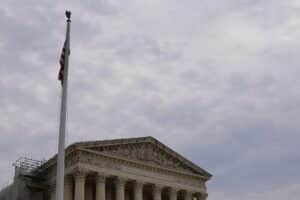Hawaii can’t ban those with permits from carrying guns in most parts of the state.
That’s the ruling handed down by U.S. District Judge Leslie Kobayashi, a Barack Obama appointee, in her Tuesday order granting a Temporary Restraining Order (TRO). She found the law the state passed in response to New York State Rifle and Pistol Association v. Bruen, which struck down the state’s previous gun-carry law as overly restrictive, is itself overly restrictive when judged by the test adopted in that case. She determined the broad scope of the state’s new “sensitive places” restrictions on carrying had no basis in the historical tradition of gun regulation, as Bruen requires, and therefore violates the Second Amendment.
“[T]his Court finds that the balance of the equities and the public interest weigh in favor of issuing a TRO,” she wrote in Wolford v. Lopez. “The public has an interest in preventing constitutional violations, and the State has not established a factual basis for the public safety concerns regarding permit-carrying gun-owners who wish to exercise their Second Amendment right to carry a firearm in public.”
The ruling is the second this week to see Hawaii’s strict weapons laws blocked by a federal judge. Tuesday’s decision comes after a Ninth Circuit panel found the state’s butterfly knife ban unconstitutional. The ruling against the state’s “sensitive places” law is also the latest example of post-Bruen carry restrictions being tossed by federal courts over the past year. Judges have found substantial parts of similar laws in New York and New Jersey also run afoul of the Second Amendment, though appeals are still pending in those cases.
Alan Beck, who represented the plaintiffs in both the “sensitive places” and butterfly knife ban cases, celebrated his second win of the week.
“We’re very pleased,” Beck told The Reload. “The court faithfully applied the methodology laid out in Heller and Bruen. She found that the state has an affirmative duty to produce historical evidence that carry was banned in the various places we challenged. And the reality is that there simply were no government-imposed bans on carrying in banks, parks, beaches, and restaurants.”
In the ruling, Judge Kobayashi laid out her view of how Second Amendment cases ought to be decided under the Bruen test.
“Bruen’s directive is clear: once an individual’s conduct is covered by the plain text of the Second Amendment, the burden is on the government to establish that the regulation is consistent with this Nation’s historical tradition of firearm regulation,” she wrote. “The exception being, of course, exclusion of firearms in traditionally ‘sensitive places.’ Then, and only then, is a gun regulation constitutional.”
She proceeded to examine the historical evidence provided by the state for why its restriction on carrying in restaurants that serve alcohol, a prohibition other states have also adopted in recent decades. First, she determined the Second Amendment covers carrying on private property that is open to the public.
“While bars and restaurants are private businesses, they are generally held open to the public, i.e., they are frequented by the general public,” Judge Kobayashi wrote. “Members of the public have a general invitation or license to enter those businesses’ properties. That invitation or license is not absolute, of course, and may be revoked if, for example, an invitee or licensee is engaging in unlawful behavior or behavior that the business deems unacceptable. But, the general rule is that members of the public are welcome to enter those establishments. Thus, the conduct of carrying a firearm in a bar or restaurant that serves alcohol is covered by the plain text of the Second Amendment because those establishments are public to the extent that members of the public are invitees or licensees who may enter those establishments during business hours, unless their invitation or license is revoked.”
Hawaii produced several Founding Era statutes barring those in militia service from consuming alcohol while armed. But Beck argued those aren’t the same as the restaurant carry ban.
“That’s simply not our clients,” he told The Reload. “They’re not on military duty, and they have no intention of carrying while drinking. They simply want to have lunch at places that serve alcohol.”
He argued the state’s historical examples justifying its attempt to make publicly-accessible private property, such as storefronts, made the same categorical error. Judge Kobayashi agreed.
“Prohibiting militia members from being sold certain types of alcohol is not closely analogous to restricting all individuals who are licensed to publicly carry a firearm from entering a bar or restaurant serving alcohol,” she wrote.
He said the Founding Era laws cited by Hawaii that banned gun carry on private property only applied to hunting on property where the public wasn’t generally allowed access. Judge Kobayashi again agreed.
“In other words, and contrary to the State’s assertion, the Second Amendment does grant a presumptive right to carry on some private property, insofar as the private property is held open to the public,” she wrote. “That presumption can change, for instance, if an owner of the private property rescinds a general license or invitation to enter the property: such as limiting entrance to members or prohibiting certain attire. There is no conflict between the two rights – the right to bear arms and the right to exclude others from one’s property – both of which preexisted the ratification of the Bill of Rights.”
Judge Kobayashi found the same category error in the state’s attempt to defend its ban on carrying in banks by citing carry bans at large gatherings.
“It appears, then, that the State contends banks and financial institutions are relevantly similar to large gathering places like fairs, markets, or Time Square,” she wrote. “This Court finds that the State fails to establish such an analogue.”
Her examination of the state’s park gun ban was a closer call. The state cited a recent ruling in Maryland Shall Issue, Inc. v. Montgomery County upholding a similar prohibition. District Judge Theodore D. Chuang, an Obama appointee, relied on a collection of carry restrictions that dated well into the 20th Century in his ruling, but Judge Kobayashi rejected most of them as falling outside the relevant period dictated by the Supreme Court.
“[O]ut of the seventeen laws the district court reviewed, only one local ordinance was enacted before the Fourteenth Amendment’s ratification and only one state law was enacted ‘during’ the time of the Fourteenth Amendment’s ratification,” she wrote. “This Court is not convinced that evidence of one local ordinance and one state law is sufficient to find that there was a national historical tradition of prohibiting the carrying of firearms in parks at the time of the Fourteenth Amendment’s ratification.”
Judge Kobayashi decided the park ban couldn’t survive Second Amendment scrutiny, and neither could the beach ban.
“Because the State argues beaches are analogous to parks to support its restriction on beaches, the State also fails to meet its burden showing that there is a national historical tradition prohibiting carrying firearms on beaches,” she wrote.
While Judge Kobayashi strictly applied the Bruen test, she did critique part of it. Specifically, she questioned the Supreme Court’s holding that laws or ordinances from cities and territories carry less weight than those from states. She said the Court’s method of counting the populations subject to historical gun restrictions in order to balance how influential they were creates added complications for judges trying to follow their lead.
“This is confounding,” she wrote. “On one hand, Bruen emphasizes the need to sift through historical evidence to assess the tradition of firearm regulations. On the other, Bruen seems to dismiss any law enacted unless it was done in a state where a significant percentage of the people – insofar as they counted as living in the United States – resided at the time that the Fourteenth Amendment was enacted.”
Hawaii has appealed several previous rulings against its gun laws but hasn’t announced what it plans to do with Wolford v. Lopez.
Beck said he and his clients are prepared to continue fighting the carry bans, but they are hopeful that might not be necessary if the state decides against pursuing appeals.
“I’m hoping they see the light of day and understand that they can’t engage in what is almost a complete ban on carrying,” Beck told The Reload. “One of my clients was able to produce a map that demonstrates roughly 96.4 percent of Maui County is a no-carry area. That’s just not reasonable.”
The office of Hawaii Attorney General Anne E. Lopez (D.) did not immediately respond to a request for comment.






